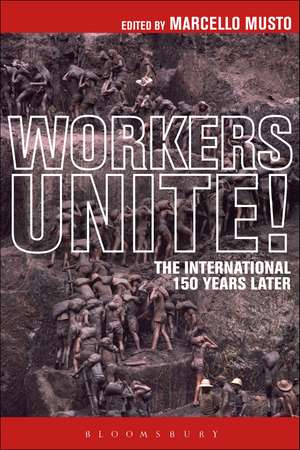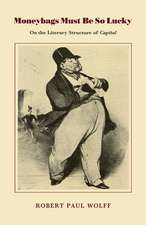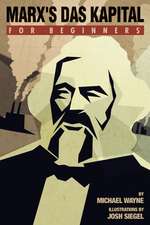Workers Unite!: The International 150 Years Later
Editat de Marcello Mustoen Limba Engleză Paperback – 22 oct 2014
| Toate formatele și edițiile | Preț | Express |
|---|---|---|
| Paperback (1) | 169.48 lei 6-8 săpt. | |
| Bloomsbury Publishing – 22 oct 2014 | 169.48 lei 6-8 săpt. | |
| Hardback (1) | 570.83 lei 6-8 săpt. | |
| Bloomsbury Publishing – 17 dec 2014 | 570.83 lei 6-8 săpt. |
Preț: 169.48 lei
Preț vechi: 194.65 lei
-13% Nou
Puncte Express: 254
Preț estimativ în valută:
32.44€ • 35.25$ • 27.27£
32.44€ • 35.25$ • 27.27£
Carte tipărită la comandă
Livrare economică 21 aprilie-05 mai
Preluare comenzi: 021 569.72.76
Specificații
ISBN-13: 9781628922431
ISBN-10: 1628922435
Pagini: 336
Dimensiuni: 152 x 229 x 23 mm
Greutate: 0.52 kg
Editura: Bloomsbury Publishing
Colecția Bloomsbury Academic
Locul publicării:New York, United States
ISBN-10: 1628922435
Pagini: 336
Dimensiuni: 152 x 229 x 23 mm
Greutate: 0.52 kg
Editura: Bloomsbury Publishing
Colecția Bloomsbury Academic
Locul publicării:New York, United States
Caracteristici
Publishing in time for the 150th anniversary of the First International meeting at St. Martin's Hall on September 28th, 1864.
Notă biografică
Marcello Musto is Assistant Professor of Sociological Theory at York University, Toronto, Canada. He has edited and authored numerous publications on Marx and Marxisms including Karl Marx's 'Grundrisse': Foundations of the Critique of Political Economy 150 Years Later (2008) and Marx for Today (2012). His work has been published worldwide in 16 languages.
Cuprins
I. PrologueII. Marcello Musto, PrefaceIII. DedicationIV. Marcello Musto, IntroductionV. The International Working Men's Association: Addresses, Resolutions, Interventions, DocumentsThe Inaugural Address1. Karl Marx, Inaugural Address of the International Working Men's AssociationThe Political Program2. Karl Marx, [Resolutions of the Geneva Congress (1866)]3. Karl Marx, [Resolutions of the Brussels Congress (1868)] Labour4. Karl Marx, [Inquiry on the Situation of the Working Classes]5. François Dupleix - Ferdinand Quinet - Jean Marly - Adrien Schettel - Jean Henri de Beumont, [Machinary and its Effects] 6. P. Eslens - Eugène Hins - Paul Robin, [On Woman's Emancipation and Independence]7. Karl Marx, [The Influence of Machinery in the Hands of Capitalists]8. Eugène Steens, [The Effect of Machinary on the Situation of Workers]9. Pierre Fluse, [The Effect of Machinary on the Wages and Situation of Workers]10. Eugène Tartaret, [For the Reduction of Working Hours]11. V. Tinayre, [On Working Women's Equality and the Inclusion of Different Political Opinions] Trade Union and Strike12. Karl Marx - [The Necessity and Limits of Trade Union Struggle]13. Karl Marx, [Against Strike Breaking]14. Various Authors, [Interference in Trades' Disputes]15. César De Paepe, [Strikes, Unions, and the Affiliation of Unions with the International]16. Karl Marx, The Belgian Massacre17. Jean Louis Pindy, [Resolution on Resistance Funds]18. Eugène Hins, [Resistance Societies as the Organization of the Future]19. Robert Applegarth, [On the Resistance Societies]20. Adhémar Schwitzguébel, [On Resistance Funds]21. Alfred Herman, [Promoting Solidarity for Strikers]22. Johann Philipp Becker, [International Trade Union Organization]Cooperative Movement and Credit23. César De Paepe, [Credit and the Emancipation of the Working Class]24. Ludwig Buechner - César De Paepe - André Murat - Louis Mueller - R. L. Garbe, [On the Cooperative Movement]25. Johann Georg Eccarius - Henri Louis Tolain, [Fourth Estate and Modern Production]26. Various Authors, [The question of Mutual Credit Among Workers]27. Aimé Grinand, [Cooperative and Workers' Emancipation]28. Eugène Hins, [Cooperative Associations as a Model of the Future Society]On Inheritance29. Karl Marx, [On Inheritance]30. Mikhail Bakunin, [On Abolition of Inheritance]31. Karl Marx, [On the Right of Inheritance]Collective Ownership and the State32. Jean Vasseur, [Definition and Role of the State]33. César De Paepe, [On the Collectivization of the Land]34. Karl Marx, [On Landed Property]35. Mikhail Bakunin, [On the Question of Landed Property]36. César De Paepe, [On the Reorganization of Landed Property]37. Emile Aubry, [On Workers Capacity to Administer Society]38. Karl Marx - Friedrich Engels - Paul Lafargue, [Critique of Bakunin's Politics]39. César de Paepe, [On the Organizaation of Public Services in the Society of Future]40. James Guillaume, [On the Abolition of the State]41. César de Paepe, [On the People's State (Volksstaat)]42. Various Authors, [On Collective Ownership]Education43. Les Relieurs de Paris, [On Free Education]44. Karl Marx, [On Education in Modern Society]45. César De Paepe, [On State Education]The Commune of Paris46. Karl Marx, [On the Paris Commune]Internationalism and Opposition to War47. Various Authors, [International Solidarity]48. Eugene Dupont - Johann Georg Eccarius - Peter Fox - Hermann Jung - Karl Marx, [On the Necessity of an International Organization]49. César de Paepe, [On the True Causes of War]50. César de Paepe, [Strike Against War]51. Louis Henri Tolain, [Against War]52. Hafner, [The Real Causes of the War]53. Karl Marx, [England, Metropolis of Capital] 54. Karl Marx, [First Address on the Franco-Prussian War]55. Karl Marx, [Second Address on the Franco-Prussian War]56. Karl Marx, [The Novely of the International]57. Karl Marx, [On the Importance of Having the International]The Irish Question58. Eugene Dupont, [On the Fenian Question]59. Karl Marx, [Ireland and the English Working Class]60. Friedrich Engels, [Relations Between the Irish Sections and the British Federal Council]Concerning the United States61. Karl Marx, To Abraham Lincoln, President of the United States of America62. Karl Marx, Address from the International Working Men's Association to President Johnson63. Karl Marx, Address to the National Labour Union of the United States64. Johann Georg Eccarius, [Eliminating Nationalism from the Minds of Working Men]Political Organization 65. Friedrich Engels - Karl Marx, General Rules of the International Working Men's Association66. Johann Georg Eccarius - Karl Kaub - George Odger - George Wheeler - William Worley, To the Working Men of Great Britain and Ireland67. Charlse Perron - Pioley - Jean Reymond - Vézinaud - Sameul Treboux, [On the Deprivation of Political Liberties]68. Karl Marx, [Against Secret Societies] 69. Friedrich Engels, [On the Importance of Political Struggle]70. Édouard Vaillant, [On Working Class Politics]71. Karl Marx, [On the Political Action of the Working Class]72. Karl Marx, [On the Question of Abstentionism]73. Friedrich Engels, [Apropos Of Working-Class Political Action]74. Karl Marx - Friedrich Engels, [On the Political Action of the Working Class and Other Matters]75. Karl Marx - Friedrich Engels, [Against Sectarianism]76. James Guillaume - [Anarchist politics]77. Paris Section, [On the Importance of a Central Organization of the Working Class]78. Mikhail Bakunin - James Guillaume, [The Distruction of Political Power]79. Friedrich Adolph Sorge, [The Struggle With Bourgeois Society] 80. Friedrich Adolph Sorge - Carl Speyer, [Passing on the Torch]VI. Appendix. The Workers' AnthemEugène Pottier, The InternationaleVII. Bibliography
Recenzii
...An incredible collection.
A wide-ranging and interesting selection [of documents] . . . Musto provides sufficient historical context to engage and inform specialists and general readers and, in this sense, he has managed to revive the IWMA from relative obscurity
The value of the sourcebook is considerable for those interested in the philosophical development and historical practice of the IWMA.
By presenting these original documents, the book provides a fascinating introduction to the first steps of the autonomous organization of the workers: what it was like and what kind of learning processes they went through. The experiences of the First International are again relevant in the present epoch of globalization.
Workers Unite! may be the most important piece of wisdom we will ever hear. In this book, the founding of the International Working Man's Association, receives a 150 birthday salute worthy of one of humanity's greatest, albeit least known, accomplishments. An extraordinary collection, often surprising, never dull, and full of insights and arguments, most of which-sadly enough-are still relevant. HIGHLY RECOMMENDED to everyone young enough in mind to learn something truly new from what appears to be old and over.
This wonderful book by Musto responds to the question: What does it mean to construct a revolution? In the decade before and after the Paris Commune communists discovered what that meant, and they proposed a non-utopian project: they didn't just imagine the impossible but demonstrated how to realize it. With the foundation of the International, the working class asserted its political realism.
A wide-ranging and interesting selection [of documents] . . . Musto provides sufficient historical context to engage and inform specialists and general readers and, in this sense, he has managed to revive the IWMA from relative obscurity
The value of the sourcebook is considerable for those interested in the philosophical development and historical practice of the IWMA.
By presenting these original documents, the book provides a fascinating introduction to the first steps of the autonomous organization of the workers: what it was like and what kind of learning processes they went through. The experiences of the First International are again relevant in the present epoch of globalization.
Workers Unite! may be the most important piece of wisdom we will ever hear. In this book, the founding of the International Working Man's Association, receives a 150 birthday salute worthy of one of humanity's greatest, albeit least known, accomplishments. An extraordinary collection, often surprising, never dull, and full of insights and arguments, most of which-sadly enough-are still relevant. HIGHLY RECOMMENDED to everyone young enough in mind to learn something truly new from what appears to be old and over.
This wonderful book by Musto responds to the question: What does it mean to construct a revolution? In the decade before and after the Paris Commune communists discovered what that meant, and they proposed a non-utopian project: they didn't just imagine the impossible but demonstrated how to realize it. With the foundation of the International, the working class asserted its political realism.











